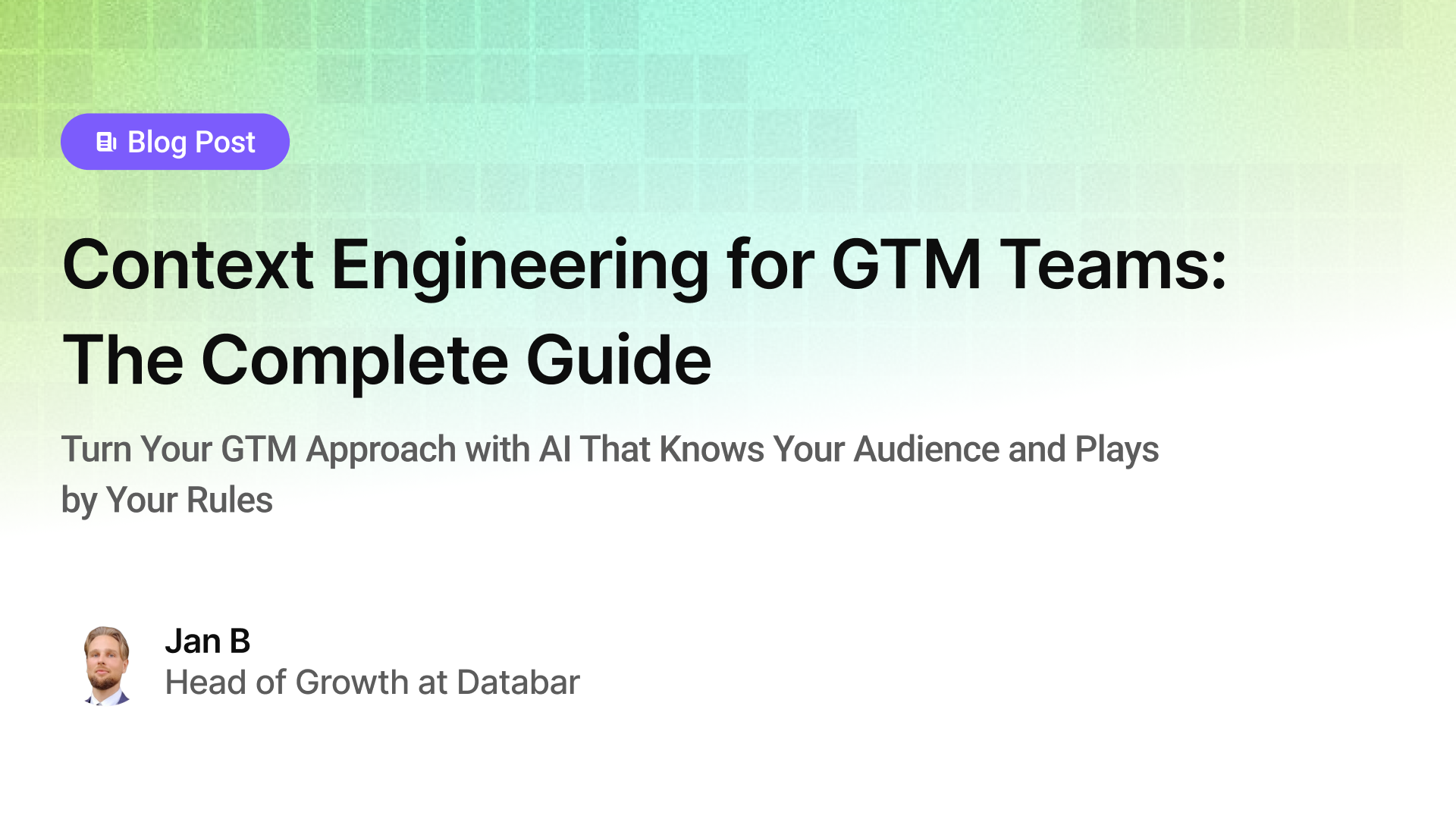GTM Engineering: The New Competitive Edge in B2B Sales
How this hybrid role is transforming B2B sales and driving measurable performance gains
Blogby JanApril 03, 2025

A new professional role is rapidly gaining prominence at the intersection of sales, marketing, and technology: the GTM Engineer. This hybrid position combines strategic sales expertise with technical data capabilities, creating a vital function for companies adopting data-driven go-to-market approaches.
According to recent research by SalesHacker, organizations with dedicated GTM Engineering functions achieve 31% higher sales productivity and 26% shorter sales cycles than those relying on traditional sales models.
This article examines what makes this role unique, why it's becoming essential, and how it's reshaping sales operations across industries.
What Defines a GTM Engineer?
The GTM (Go-To-Market) Engineer bridges traditional sales operations and technical data science. Unlike conventional sales roles focused primarily on relationship building or technical roles focused solely on systems, the GTM Engineer exists specifically to combine outbound sales and marketing through data-driven approaches.
Core responsibilities typically include:
- Building and optimizing automated outbound sequences across channels
- Creating data enrichment workflows to improve targeting precision
- Developing technical systems that prioritize high-value prospects
- Implementing performance measurement systems for continuous optimization
- Translating sales needs into technical solutions (and vice versa)
"GTM Engineers fundamentally transform how sales teams operate. They replace gut feelings with data, manual research with automation, and generic outreach with hyper-personalization."
Key Skills That Define Successful GTM Engineers
The most effective GTM Engineers possess a blend of sales acumen and technical capabilities:
Strategic Sales Understanding
- Deep familiarity with B2B sales processes and buyer psychology
- Knowledge of effective outbound methodologies and multi-channel approaches
- Understanding of sales qualification frameworks (BANT, MEDDIC, etc.)
- Experience with sales messaging and conversion tactics
Technical Capabilities
- Data management and enrichment expertise
- Proficiency with automation platforms and workflow design
- Working knowledge of API integrations and data flows
- Ability to implement and optimize sales technology stacks
Analytical Skills
- Data analysis and performance measurement
- A/B testing methodologies and statistical evaluation
- Pattern recognition for identifying high-performing tactics
- Conversion optimization across sales funnels
How GTM Engineers Transform Outbound Operations
The impact of introducing GTM Engineering capabilities typically manifests in four key areas:
1. Improved Data-Driven Targeting
GTM Engineers build sophisticated systems that continuously improve prospect targeting through multi-source data enrichment. Rather than relying on basic firmographic information, these systems incorporate:
- Real-time buying intent signals
- Technographic profiles and technology usage patterns
- Growth indicators and organizational changes
- Digital engagement and content consumption patterns
2. Workflow Automation and Scalability
Manual processes limit sales capacity. GTM Engineers create automated workflows that handle repetitive tasks while maintaining personalization:
- Multi-step qualification processes that adapt based on prospect responses
- Data enrichment systems that run continuously without manual intervention
- Personalization engines that inject relevant context into outreach
- Lead routing and prioritization based on sophisticated scoring algorithms
"Our GTM Engineer built workflows that increased our team's capacity by 3.4x without adding headcount," reports David, Director of Sales "Tasks that previously consumed hours now happen automatically."
3. Measurement and Optimization Systems
Where traditional sales operations often struggle with performance visibility, GTM Engineers implement comprehensive measurement systems:
- Granular tracking across the entire prospect journey
- Attribution models that identify the most effective touchpoints
- Conversion analytics that highlight optimization opportunities
- Real-time dashboards for tactical decision-making
These measurement capabilities modify sales from an art to a science, allowing for constant refinement based on actual performance data.
4. Technical Integration of Sales Stack
Many organizations struggle with fragmented sales tools that don't effectively share data. GTM Engineers solve this through:
- Creating unified data models across platforms
- Building custom integrations between specialized tools
- Implementing centralized data repositories for consistent information
- Developing standardized processes that leverage the full technology stack
The Growth of GTM Engineering as a Distinct Function
The emergence of GTM Engineering reflects significant changes in the B2B sales landscape:
- Rising complexity of the sales technology ecosystem - The average enterprise now uses 10+ sales tools, creating integration challenges
- Increased importance of data-driven decision making - Access to more data has created both opportunities and challenges for sales teams
- Heightened expectations for personalization at scale - Buyers now expect relevant, contextual communications even in initial outreach
- Growing need for technical expertise in sales operations - Traditional sales approaches struggle with modern technical requirements
According to LinkedIn's emerging jobs report, roles combining sales operations and technical skills have grown by 41% year-over-year, making this one of the fastest-growing professional categories.
How Databar.ai Empowers GTM Engineers
GTM Engineers require powerful tools that enable data-driven sales operations. Platforms like Databar.ai provide capabilities specifically designed for this emerging role:
- Multi-source data enrichment - Access to 90+ data providers through a single interface eliminates the need to manage multiple subscriptions and data sources
- Custom enrichment workflows - The ability to create tailored data workflows without coding makes sophisticated targeting accessible even to teams without extensive technical resources
- Automated personalization systems - Built-in capabilities for turning enriched data into personalized outreach significantly improve response rates
- Technical flexibility with API access - Open architecture allows GTM Engineers to integrate enrichment capabilities throughout the sales and marketing stack
A software solution provider for e-commerce using Databar.ai reported a 74% reduction in lead research time while simultaneously improving personalization quality, demonstrating how the right tools amplify GTM Engineering impact.
Implementing GTM Engineering in Your Organization
For companies looking to incorporate GTM Engineering capabilities, consider these implementation approaches:
1. Start with a Pilot Project
Begin with a focused project that demonstrates value, such as:
- Building an enrichment workflow for a specific target segment
- Creating an automated qualification process for inbound leads
- Developing a data-driven prioritization system for the sales team
2. Define Clear Success Metrics
Establish specific KPIs to measure impact:
- Time saved through automation
- Improvement in targeting precision
- Increase in positive response rates
- Growth in conversion rates
3. Build Cross-Functional Collaboration
Effective GTM Engineering requires input from multiple teams:
- Sales teams to define requirements and validate approaches
- Marketing to align messaging and targeting
- IT/Engineering to provide technical support and integration capabilities
- Revenue Operations to implement process changes
4. Invest in the Right Technology
Provide the necessary tools for success:
- Data enrichment platforms with multi-source capabilities
- Automation systems for outreach and workflow management
- Analytics tools for measurement and optimization
- Integration capabilities to connect systems
GTM Engineering in the Future
As this hybrid role continues to evolve, several trends are emerging:
- AI-powered decision support - Machine learning will increasingly assist GTM Engineers in identifying the most effective strategies
- Expanded channel integration - GTM Engineering will extend beyond email and LinkedIn to incorporate additional touchpoints
- Predictive optimization - Advanced analytics will enable proactive adjustments to strategies based on predicted outcomes
- Deeper personalization capabilities - Natural language processing will enable more sophisticated content customization at scale
Transitioning to a GTM Engineering Role
For sales professionals interested in developing GTM Engineering capabilities, consider these steps:
- Build technical literacy - Develop foundational knowledge of databases, APIs, and automation systems
- Learn data analysis fundamentals - Understand how to extract insights from sales performance data
- Master key sales technologies - Gain hands-on experience with CRM systems, enrichment platforms, and outreach tools
- Develop process design skills - Practice creating structured workflows that can be automated
- Seek hybrid project opportunities - Volunteer for initiatives that combine sales strategy with technical implementation
Final Thoughts
The GTM Engineer represents a critical evolution in how B2B organizations approach sales and marketing. By combining sales expertise with technical capabilities, these professionals create systems that significantly improve efficiency, precision, and results.
As data continues to drive sales strategy and buyers expect increasingly relevant experiences, the value of GTM Engineering will only grow. Organizations that invest in these capabilities now position themselves for significant competitive advantages in an increasingly complex sales landscape.
Frequently Asked Questions
What backgrounds do successful GTM Engineers typically have?
Most come from either sales operations roles with growing technical responsibilities or technical roles with increasing sales involvement. The common thread is a deep interest in both sales strategy and systems implementation.
How is GTM Engineering different from Sales Operations?
While there's overlap, GTM Engineering focuses more specifically on building and optimizing technical systems for sales execution, with particular emphasis on data management, automation, and technical integration.
What metrics best measure GTM Engineering success?
Key performance indicators include: research time reduction, improvement in targeting accuracy, increase in positive response rates, growth in conversion rates across stages, and expansion of sales capacity without headcount growth.
Should GTM Engineering report to Sales or Technical departments?
Most successful implementations have GTM Engineering report to Revenue Operations, creating natural alignment with both sales leadership and technical teams while maintaining independent focus.
How technical does a GTM Engineer need to be?
While programming expertise isn't typically required, successful GTM Engineers need strong technical literacy, including understanding of databases, API integrations, and workflow automation concepts. The ability to collaborate effectively with technical teams is essential.
Related articles

How to Audit Your CRM Data Quality with Claude Code
How to Spot and Solve Data Problems That Slow Down Your Sales
by Jan, February 28, 2026

Context Engineering for GTM Teams: The Complete Guide
Turn Your GTM Approach with AI That Knows Your Audience and Plays by Your Rules
by Jan, February 27, 2026

How to Build Claude Code Skills for GTM (With Templates)
Master GTM Automation with Step-by-Step Claude Code Skill Templates
by Jan, February 26, 2026

Claude Code for GTM Engineers: The Practical Guide to Building Campaigns in 2026
How GTM engineers can save time and boost accuracy with Claude Code
by Jan, February 25, 2026